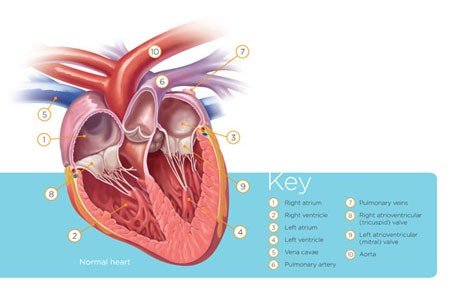- Not a substitute for professional veterinary help.
Congestive heart failure in dogs, or CHF, occurs commonly among older pets. In fact, 20–25 percent of dogs between the ages of 9 and 12 years can be affected. Fortunately, dogs don’t tend to die of heart attacks like we do. Experts say that if CHF is caught early on, the prognosis can be good.
If your dog is diagnosed with CHF, identifying a cardiologist is an important next step. Your vet will help you with this process.
What is Congestive Heart Failure in Dogs?
“Congestive Heart Failure (CHF) … refers to the heart’s inability to pump adequate blood to the body.” –(source)
Your dog’s heart is a four-chambered pump made of muscle. The four chambers are separated by heart valves, which ensure that blood can only flow in one direction. Each contraction of the heart muscle pumps blood around your dog’s body, supplying the organs with the energy and oxygen they need, while at the same time carrying away the waste products.
When the heart valves age in an abnormal way, that allows blood to leak backwards so that with each heartbeat you hear a heart murmur.
About 10 percent of all dogs have heart disease. Breeds that are predisposed to heart disease include:
- Boston Terrier
- Cavalier King Charles Spaniel
- Chihuahua
- Fox Terrier
- Miniature Pinscher
- Miniature and Toy Poodles
- Miniature Schnauzer
- Pekingese
- Pomeranian
- Whippet
Symptoms of CHF in dogs
The most common sign is coughing accompanied by difficulty breathing. Notice the difference between the early and later stage symptoms, and keep an eye out for any of these with your own dog. If you notice any of these symptoms, let your vet know immediately.
Early Stages
- Reduced activity/lethargy
- Increased sleeping
- Exercise intolerance
- Coughing—especially at night or early morning
- Weight loss
- Diarrhoea
- Possible fainting spells
Late Stages
- Persistent early stages
- Severe weight loss
- Distended abdomen
- Vomiting/diarrhea
- Blue-grey coloured gums
- Leg swelling
- Difficulty breathing
- Fluid lung sounds
- Unable to rest
Crisis—Immediate veterinary assistance needed regardless of the disease
- Difficulty breathing
- Prolonged seizures
- Uncontrollable vomiting/diarrhea
- Sudden collapse
- Profuse bleeding—internal or external
- Crying/whining from pain
How is CHF diagnosed in dogs?
A full physical examination will be needed to determine the cause and whether there is an abnormal heart size, fluid accumulation, pleural effusion, and heart defects.
Steps towards a diagnosis of congestive heart failure in dogs:
- Listening to the heart with a stethoscope
- Chest X-rays
- Blood and urine tests
- An electrocardiogram (ECG). Sometimes an ultrasound is done as well.
Treatment for CHF
Treatment depends on the severity of the disease. The treatment plan will typically include a variety of drugs (and supplements).
Heart medication for dogs
- Diuretics like furosemide are medications used to remove excess fluid buildup from the lungs or abdomen.
- Inodilators are medications that both increase myocardial contractility and open up constricted blood vessels, reducing the workload on your dog’s weakened heart. The only one available currently is Pimobendan (VETMEDIN).
- ACE inhibitors, or inhibitors of angiotensin-converting enzyme, are a group of medications that open up constricted blood vessels.
Monitoring
Dogs with CHF are monitored for lethargy, weakness, collapse, difficulty breathing, coughing or abdominal distension. As mentioned previously, an increased respiratory rate (RR) is the first sign of fluid accumulation (or pain) in the lungs.
It’s important to count the number of breaths your dog takes in one minute while sleeping or resting. If this number is over 40 or gradually increasing, you should contact your vet immediately.
If you see an increased respiratory rate, contact your vet.
Start by downloading a respiratory rate app, which will help you monitor your dog’s breathing, as this is the most important indicator that your dog is going into heart failure again.
If you suspect or know your dog has a heart murmur, you and your vet will discuss heart disease and dive into some or all of the diagnostics listed here.
Prognosis for dogs with congestive heart failure
This is a progressive disease, and new problems and symptoms may arise in the future. For example, the return of fluid in the lungs, followed by lethargy and sudden collapse, can occur. With appropriate medical therapy, fortunately, most dogs feel good during treatment and experience a good quality of life during and after. If you can’t be around as much as you like, you can rely on a loving Rover.com pet sitter to keep an eye on your dog and give them all of the affection they deserve while you’re gone.



